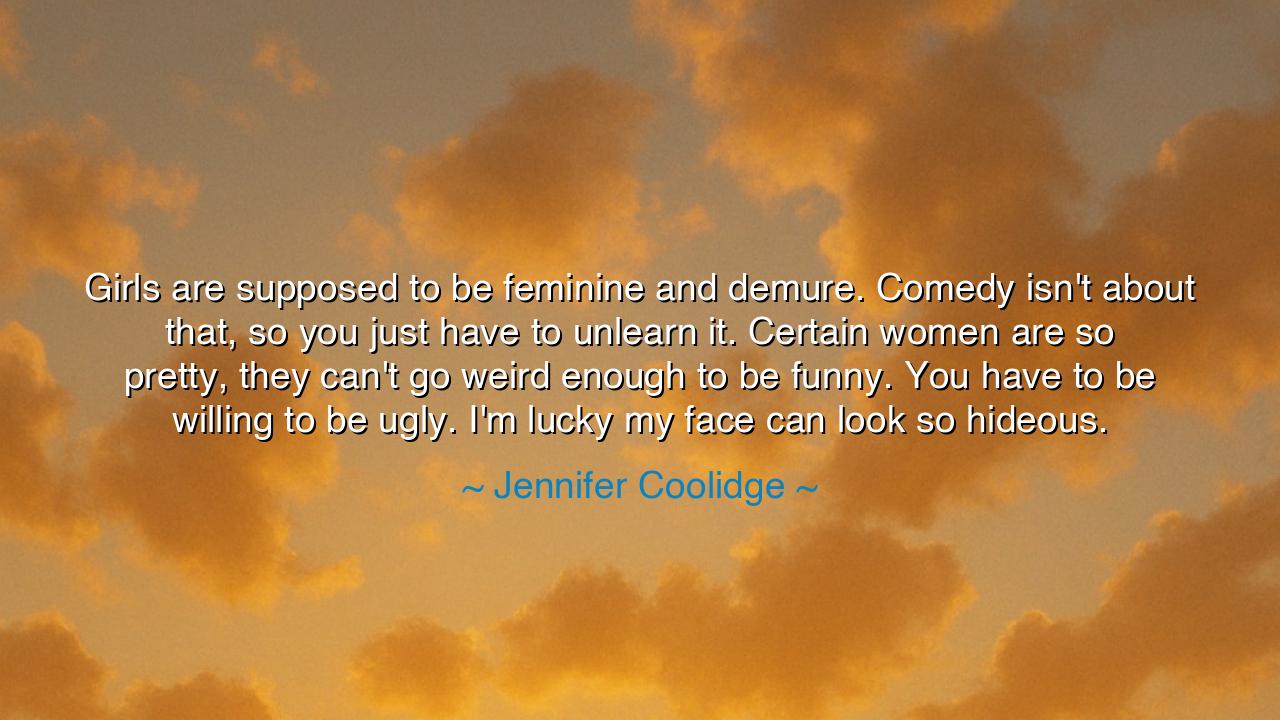
Girls are supposed to be feminine and demure. Comedy isn't about
Girls are supposed to be feminine and demure. Comedy isn't about that, so you just have to unlearn it. Certain women are so pretty, they can't go weird enough to be funny. You have to be willing to be ugly. I'm lucky my face can look so hideous.






The actress Jennifer Coolidge, with her sharp wit and unflinching honesty, once said: “Girls are supposed to be feminine and demure. Comedy isn't about that, so you just have to unlearn it. Certain women are so pretty, they can't go weird enough to be funny. You have to be willing to be ugly. I'm lucky my face can look so hideous.” Though her tone is playful, her words carry the gravity of rebellion — the rebellion of a woman who broke through the gilded mask that society pressed upon her. Beneath the laughter lies a deeper wisdom: that true creativity requires courage, the courage to be imperfect, to be strange, to be real.
To the ancients, this idea would have been called parrhesia — the courage to speak freely and live truthfully, even when it offends convention. Jennifer Coolidge speaks as one who has unlearned the illusions of beauty that bind so many. “Girls are supposed to be feminine and demure,” she says, echoing an ancient expectation that women must please, not provoke; smile, not challenge. But comedy — that divine art of truth-telling through laughter — demands the opposite. It calls for vulnerability, for risk, for the shedding of masks. To be funny, one must be free — and freedom rarely looks polite.
Comedy, in its truest form, is sacred rebellion. The ancients knew this well. The Greeks placed the god Dionysus at the heart of both theater and madness — for he represented the power to destroy illusion through laughter and excess. The comedians of Athens, like Aristophanes, mocked kings and philosophers alike, stripping away pretension with humor. In their laughter, society glimpsed its own absurdity. And yet, women were often denied this power. For laughter, when wielded by a woman, was seen as dangerous — a sign not of charm, but of defiance. Coolidge’s words, therefore, are not only about performance, but about liberation: the freedom to be more than an ornament.
“You have to be willing to be ugly,” she says — and this, too, is ancient wisdom. For ugliness, in its truest sense, is the rejection of false beauty. It is the willingness to show truth unfiltered. The philosopher Diogenes, who lived in a barrel and mocked the powerful, was once told he lived like a dog. He replied, “Yes, but a dog’s life is honest.” So too, Coolidge’s humor is honest. In embracing imperfection — in letting her face twist, contort, and mock — she becomes beautiful in a higher way: beautiful in truth. Comedy, for her, is not adornment, but revelation — a mirror held to the world without fear of how it reflects her.
Her statement, “I’m lucky my face can look so hideous,” may draw laughter, but beneath it lies deep humility. She recognizes that authenticity is more powerful than vanity. Many chase the fleeting admiration of beauty; few dare to sacrifice it for art. Yet Coolidge understands that the soul’s radiance grows brightest when it is unconcerned with appearances. Just as the sculptor must strike the marble to reveal the form within, so must the comedian destroy the mask to reveal truth. The ancients called this process catharsis — the cleansing of the soul through laughter and tears alike.
Consider Lucille Ball, the legendary comedienne who once risked her entire career by being ridiculous on screen. At a time when women were expected to be delicate, she fell into pies, smeared chocolate across her face, and laughed louder than anyone else dared. Many mocked her for defying grace; history remembers her for redefining it. In her fearless foolishness, she found immortality. Coolidge stands in that same lineage — a priestess of laughter who teaches that freedom begins the moment we stop apologizing for how we appear.
And so, the lesson of Jennifer Coolidge’s wisdom is this: Unlearn the false teachings of perfection. Do not fear being strange, awkward, or even ugly, for it is through those cracks that truth and brilliance shine. Whether in art, love, or life, choose authenticity over approval. Laugh loudly, even when it startles others. Let the world see you as you are — unpolished, expressive, alive. For the mask of beauty may win admiration, but only authenticity wins freedom.
Therefore, dear listener, remember this ancient truth reborn through Coolidge’s voice: To be truly funny, truly creative, and truly alive, one must be willing to be real — even when real looks ridiculous. Do not fear to be foolish, for the fools of one age are often the prophets of the next. Embrace your flaws, your laughter, your chaos — for in daring to be “ugly,” you may just uncover the deepest beauty of all: the beauty of being fearlessly yourself.






AAdministratorAdministrator
Welcome, honored guests. Please leave a comment, we will respond soon